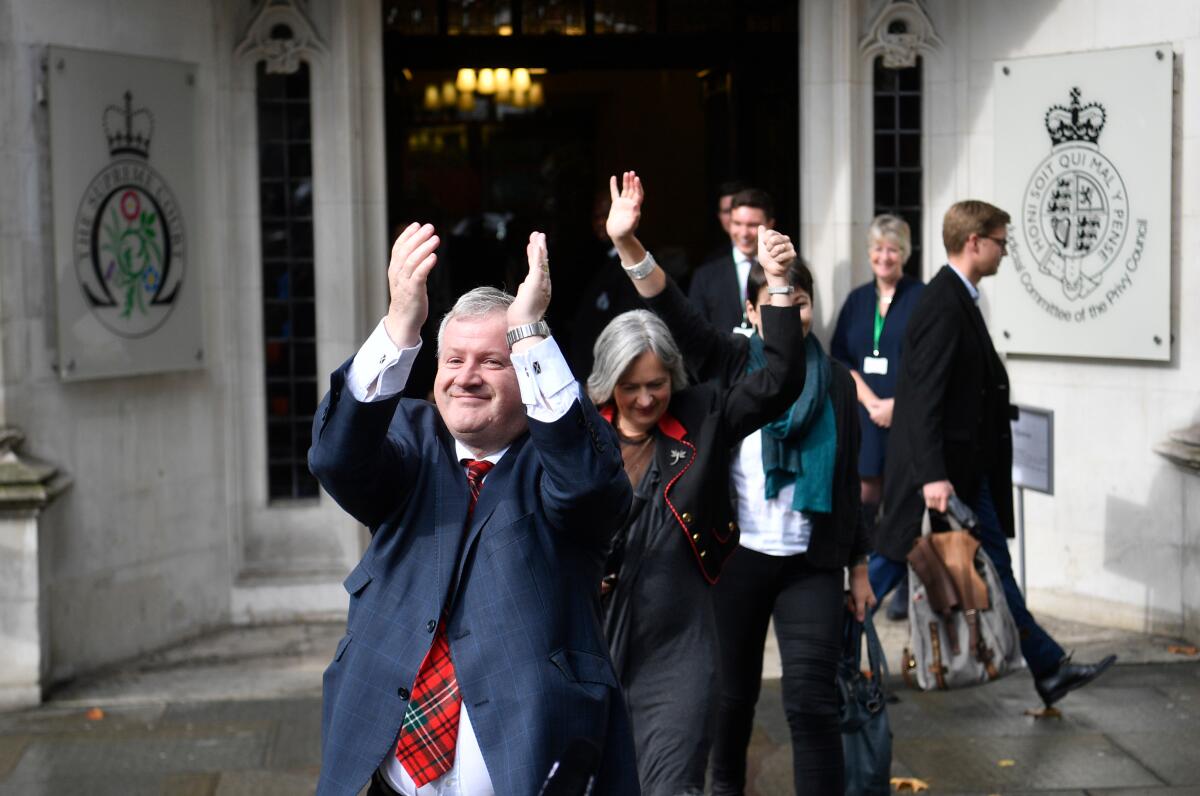Critics demand Boris Johnson’s resignation after Supreme Court ruling goes against him

- Share via
LONDON — Britain’s Supreme Court dealt Prime Minister Boris Johnson a staggering blow on Tuesday, unanimously ruling that he acted unlawfully in suspending Parliament this month during a crucial countdown to the country’s departure from the European Union.
The ruling, which immediately sparked calls for Johnson’s resignation, throws the already messy Brexit process into a next-level degree of disarray.
Johnson, in New York, said he would respect the verdict although he “profoundly” disagreed with it. At a side-by-side news conference with President Trump at the United Nations, he brushed aside talk of stepping down, with the U.S. leader offering an enthusiastic new endorsement of his beleaguered counterpart.
“I’ll tell you, I know him well, he’s not going anywhere — don’t worry about him,” Trump told reporters. “It takes a man like this to get it done.”
The prime minister said the important thing now was to “get on and deliver Brexit.”
Even in a three-year Brexit saga filled with extraordinary twists and turns, the Supreme Court confrontation stood out, raising wrenching questions about the rule of law, the role of Parliament and the government’s relationship with Britain’s long-serving monarch, Queen Elizabeth II.
The queen is supposed to remain above the political fray and serve as a symbol of national unity, but Johnson’s tenure as prime minister has seen her drawn into the Brexit drama. The monarch, by long tradition, grants permission for a parliamentary suspension requested by the prime minister.
The Supreme Court ruling, however, strongly suggested that Johnson misled the queen about his reasons for suspending lawmakers’ work — which was, in the eyes of some critics, an unforgivable offense.
The country is scheduled to leave the EU on Oct. 31, and Johnson has insisted he wants to negotiate a withdrawal accord with the bloc. But the prime minister, who took office in late July, has not committed to obeying a law passed by Parliament this month saying that if he can’t produce such an accord, he must seek a delay.
Johnson’s seeming game of chicken with EU officials — using the threat of a no-deal departure as a negotiating ploy — alarmed lawmakers, including many from the prime minister’s Conservative Party.
Leaving without a withdrawal agreement could threaten supplies of some food and medicines and snarl supply chains, according to scenarios produced by Johnson’s own government. Economists, who generally say that even a negotiated departure would leave Britons poorer, say a no-deal exit would be a shock that could plunge the country into recession.
In its sharply worded ruling, the high court rejected Johnson’s stated rationale for suspending Parliament for five weeks as the Brexit deadline approached. His government at the time characterized it as a routine break between sessions that would give the prime minister a clean slate for setting his domestic agenda — a contention that was met by a loud outcry from opponents, together with legal challenges.
There were audible gasps in the courtroom as the high court’s president, Brenda Hale, read out Tuesday’s verdict. She said the suspension was “unlawful because it had the effect of frustrating or preventing the ability of Parliament to carry out its constitutional functions, without reasonable justification.”
Johnson was to fly back to London overnight in time for Parliament’s expected meeting on Wednesday.
“Obviously this is a verdict we will respect,” he said. “I don’t think that it’s right, but we will go ahead, and of course Parliament will come back.”
Brexit has caused enormous upheaval in British politics, driving out two prime ministers and putting unprecedented strains on the country’s democratic institutions. Now Johnson’s grip on power could be imperiled.
Michael Gordon, a professor of constitutional law at the University of Liverpool, called the ruling “astonishing,” adding: “It’s difficult to imagine how it could be more disastrous” for Johnson’s government.
Even as Johnson’s allies insisted he would not change course on Brexit, his political opponents said his position had become untenable. Labor Party leader Jeremy Corbyn interrupted his party conference in the seaside city of Brighton to call for the election of “a government that respects democracy.”
“I invite Boris Johnson ... to consider his position and become the shortest-serving prime minister there has ever been,” he said.
Jo Swinson, leader of the opposition Liberal Democrats, said Johnson was “not fit to be prime minister.”
Joanna Cherry of the Scottish National Party, who brought forward a case that resulted in a stinging ruling against Johnson by Scotland’s highest civil court this month, said the prime minister should “have the guts for once to do the decent thing and resign.”
And even some Brexit hard-liners who have allied with the 55-year-old prime minister in his push for a no-deal Brexit rather than a delay took the opportunity to pile on.
The head of the Brexit Party, Nigel Farage, said sending lawmakers home at such a critical moment was “the worst political decision ever.” Farage’s party was created this year solely to push for leaving the EU on schedule regardless of the consequences.
Special correspondent Boyle reported from London and Times staff writer King from Washington.
More to Read
Sign up for Essential California
The most important California stories and recommendations in your inbox every morning.
You may occasionally receive promotional content from the Los Angeles Times.













